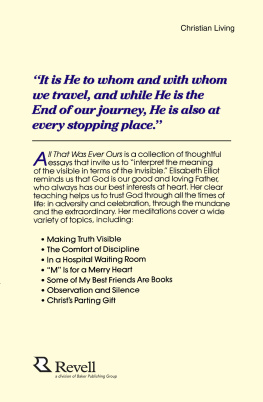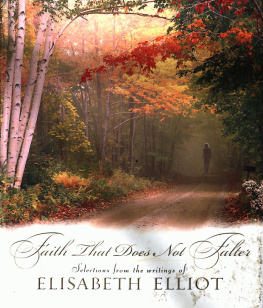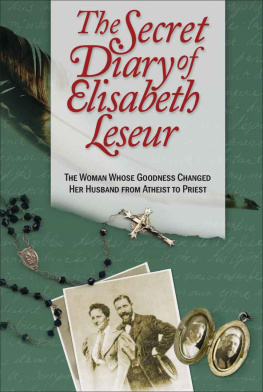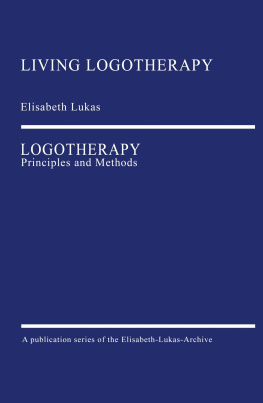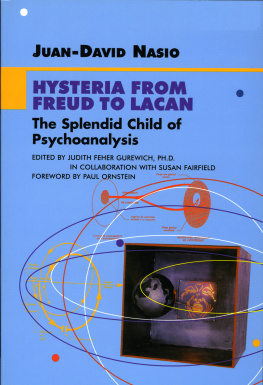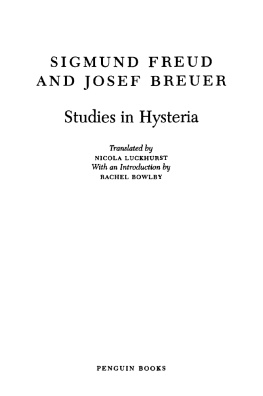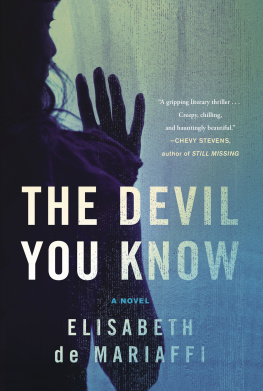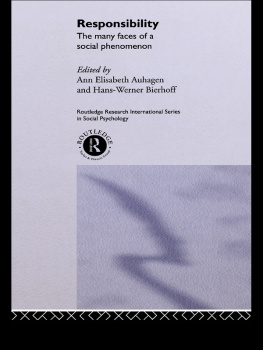Elisabeth de Mariaffi - Hysteria
Here you can read online Elisabeth de Mariaffi - Hysteria full text of the book (entire story) in english for free. Download pdf and epub, get meaning, cover and reviews about this ebook. year: 0, genre: Art. Description of the work, (preface) as well as reviews are available. Best literature library LitArk.com created for fans of good reading and offers a wide selection of genres:
Romance novel
Science fiction
Adventure
Detective
Science
History
Home and family
Prose
Art
Politics
Computer
Non-fiction
Religion
Business
Children
Humor
Choose a favorite category and find really read worthwhile books. Enjoy immersion in the world of imagination, feel the emotions of the characters or learn something new for yourself, make an fascinating discovery.
- Book:Hysteria
- Author:
- Genre:
- Year:0
- Rating:4 / 5
- Favourites:Add to favourites
- Your mark:
- 80
- 1
- 2
- 3
- 4
- 5
Hysteria: summary, description and annotation
We offer to read an annotation, description, summary or preface (depends on what the author of the book "Hysteria" wrote himself). If you haven't found the necessary information about the book — write in the comments, we will try to find it.
Hysteria — read online for free the complete book (whole text) full work
Below is the text of the book, divided by pages. System saving the place of the last page read, allows you to conveniently read the book "Hysteria" online for free, without having to search again every time where you left off. Put a bookmark, and you can go to the page where you finished reading at any time.
Font size:
Interval:
Bookmark:
For my grandmother,
Marcella Neufeld,
and especially for her grandmother,
Maria Sieber
a girl who walked a very long way
A little child died, and its mother fell to weeping. Then the child
came to her and said, Mother, do not cry so much. I am deep in
water. If you cry any more, I will drown.
from Niederlausitzer Volkssagen (Folktales of Lower Lusatia),
compiled by Karl Gander, 1894
T he dog was standing at the edge of the clearing, hackles raised. It lowered its head, watching her, but made no warning sound. Heike crouched where she had fallen, on her hands and knees, maybe twenty-five feet away. For a moment she froze, fear dropping low into her body. She was used to worrying about soldiers, but there were no people with the animal. It might have been a wolf.
No: a wolf would not be so purely black, and its fur would be matted. She sat up, moving slowly. Twenty-five feet is nothing for a dog.
Shed come hard through the bush, her arms and hands badly scratched, and her throat raw from calling out, despite the danger of being heard. Her braids loose and tangled. When a root caught her foot, shed pitched forward, slamming her shoulder against a stump. She hadnt slept for two days, her bones heavy with exhaustion.
A village dog. Shed been calling for Lena and the dog had heard her. The dog would have heard her coming from some distance. It took a step toward her now, still in the shelter of the forest.
It was early, the sky a light violet. Heike gathered her basket from where it had fallen and rose to her feet. She had no kind of bribe, no treat to throw. The bread shed been carrying was long gone; the girls living on what they could find, chewing on hay to fool their stomachs, pinching the snow off evergreen boughs and rolling it around on their tongues.
Theyd avoided the road, instead making sure to stay half-hidden in the bushes. Two sisters hunting for berries at the edge of a wood. Winter berries. Relentless as little sparrows. Heike told stories to distract them as they walked: the one about a raven that turns into a golden bird, the one about the twelve sisters who disappear every night, dancing through the soles of their shoes by morning. Lena repeating the words in her sleep, Once there was a king who had twelve daughters, each more beautiful than the other.
In the end, theyd wandered too far west. At night, Heike could hear the echo of artillery fire rolling out through the hills, and shed led Lena deeper and deeper into the woods.
Now she began to skirt the edge of the little clearing, keeping her eyes low. Where the hill descended into valley the earth broke up, rocky, and the trees changed. She gripped a branch for balance, the new buds rough against her skin. Down farther, there was a stream. She could hear it running freely, the water no longer trapped under ice. It was late March, colder in the hills than it would have been at home. She knelt by the stream to drink, and her knees got wet, her skirt soaking through.
On the other side, the forest rose up into another, steeper incline. There was a sound behind her and when she looked, she saw the dog again, maybe fifteen feet away this time. Its eyes on her, unwavering. Whether it was following her or hunting her, Heike could not be sure.
I N D RESDEN, her mother had often taken them walking by the river at night. The stars came out, one by one, and they rushed to count them where they reflected in the Elbe, a game between the three of them. This seemed so long ago now that Heike no longer knew if it was a real memory or only another story she told, a way to pass the time on the long days of walking.
On a clear night, the river glittered like heaven.
This is what she thought of now, kneeling by the stream. If her mother was looking at the water when the firebombs came down, the whole city sparkling, the river rising up to meet a massive star. Like a shower of suns.
Heike got to her feet. She had on a pair of leather boots and a mans overcoat, her fathers, and a kerchief around her hair; Lena had worn boys pants and shoes with laces. They didnt have any gloves, and sometimes shed taken off the kerchief and wrapped it around Lenas hands like a muff. The tips of her own fingers had suffered, bleaching white now at the touch of any cold. The blood remembers: whats lost to the mind is not lost to the body.
She clambered up the bank. Shed been circling the same area since Lena was lostfive days, or six, shed lost countwidening out the search a little each time. At night, she sat with her back against a tree and worked to keep her eyes open. Just in case, in case Lena was somewhere close by, crying. She didnt want to call out in the nighttime, a girls voice, lonely in the dark.
Once she thought she saw a fawn, was sure of its shape and the spindles of its legs, but when she looked again it had only been a fallen branch. She followed any noise, any rustle or crack of twigs, but the sounds never led her to Lena.
Alone now in the woods, she found herself checking again and again for the dog. Anxious. Willing it to be another trick of exhaustion, a vision she could blink awaybut it was always there, close by, its paws soundless on the hard ground.
O N THE OTHER SIDE of the rise there was no forest. The dog let out a low growl; it was right beside her now, huge and panting. Taller at the shoulder than Heikes waist. There was a trace smell of smoke in the air.
She could tell what had happened by the emptiness, by all the paper in the field. What remained after the fighting: every soldier with a picture of his sweetheart in his breast pocket, every soldier with a photograph of his mother. And when they were hit, pfoum! Like confetti.
There were no people left. There were not even bodies. Just bits of paper.
At the edge of the village she found a barn, its door not fixed, the latch batting lightly in the breeze. Heike went inside, shutting the door behind her. If the soldiers had already been through here, then it was a safe place. She hoped that the dog, shut outside, would tire of waiting for her. She climbed up into a corner hayloft and closed her eyes.
Halfway through the night, she heard them come through again, but it was only a handful of voices and some random gunfire, a cleanup crew or a few angry survivors, the dog outside kicking up a fuss and waking her. She pulled herself into a darker corner, holding her breath.
In the morning it was very quiet. She came out from where she was hiding. There was a girl on the barn floor: the soldiers had dragged her in during the night.
When theyd first come in, Heike hadnt moved, hidden away up near the rafters. But the sound of the girls voice, crying out, made her sick with fear, and she crawled to the edge of the loft to see her face, to at least make sure it wasnt Lenait wasnt, this girl tall and lean with copper-coloured hair, sixteen years old at least. Heike pulled her hood tighter, deep in the back corner of the hayloft. Her arms wrapped around her head so that she wouldnt hear.
Now the soldiers were gone, but the girl was still there. She was dead, her skirt wrapped tight around her face.
Heike looked at her from the hayloft, lying there with her neck at an odd angle, and then climbed down the ladder to the ground. There was no sound from outside. The girls body scared her in its stillness, her skin almost blue. She had no boots on, only a pair of house slippers, worn through, not meant for the snow and the outdoors. Once there was a king who had twelve daughters, each more beautiful than the other. Heike left the barn as shed found it, with the door half open.
It had turned cold again in the night: outside, the ground was white with frost. On the other side of the barn she found the dog, shot in the belly. Its fur was so dark you couldnt see the wounds, but blood soaked the earth around it.
Font size:
Interval:
Bookmark:
Similar books «Hysteria»
Look at similar books to Hysteria. We have selected literature similar in name and meaning in the hope of providing readers with more options to find new, interesting, not yet read works.
Discussion, reviews of the book Hysteria and just readers' own opinions. Leave your comments, write what you think about the work, its meaning or the main characters. Specify what exactly you liked and what you didn't like, and why you think so.




